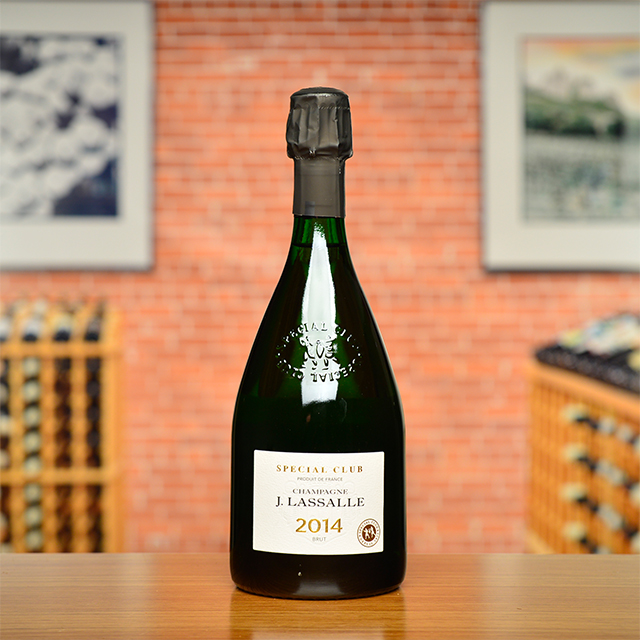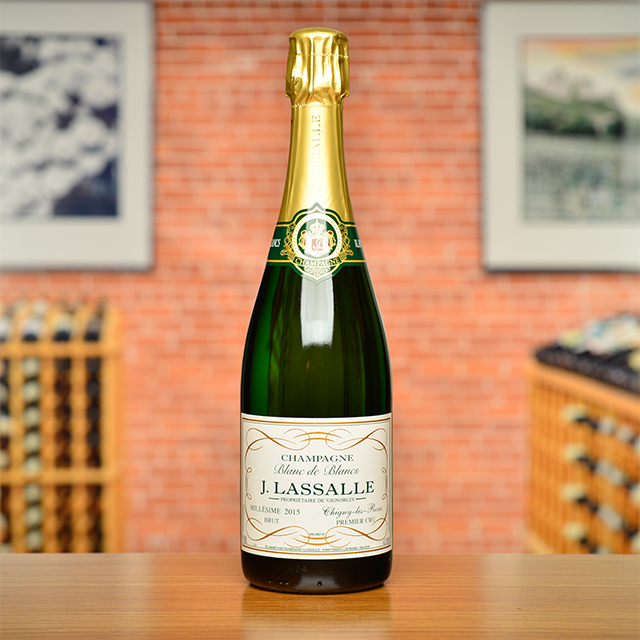Notify me
NV Rosé Brut 1er Cru
J. Lassalle
Raise your glass high: this year marks the fortieth anniversary of our collaboration with J. Lassalle! Some of the house secrets—and keys to such longevity—include using an ancient, vertical, wooden basket press to extract only the most delicate juice, permitting malolactic fermentation to occur naturally for all wines, and aging the wines extensively in their cool cellars so that each cuvée achieves maximum refinement at release. Lush and plush, with aromas of strawberries and cream, this wine is so elegant that it can make an immature boor such as myself feel like a sophisticated gentleman.
—Anthony Lynch
| Wine Type: | sparkling |
| Vintage: | NV |
| Bottle Size: | 750mL |
| Blend: | Approximately 70% Pinot Noir, 15% Chardonnay, 15% Pinot Meunier |
| Appellation: | Chigny-Les-Roses |
| Country: | France |
| Region: | Champagne |
| Producer: | J. Lassalle |
| Winemaker: | Chantal Decelle-Lassalle and Angéline Templier |
| Vineyard: | 50 years average, 16 ha total |
| Soil: | Clay, Limestone |
| Aging: | Aged minimum 42 months on the lees before disgorgement |
| Farming: | Lutte Raisonnée |
| Alcohol: | 12% |
More from this Producer or Region

2011 Brut 1er Cru “Cuvée Angéline” MAGNUM
France | Champagne
This blend of Pinot Noir and Chardonnay is a Champagne of luxury, from its decadent golden tinge to the fine, persistent bead that playfully caresses the palate.

2014 Brut 1er Cru “Special Club”
France | Champagne
The Spécial Club represents an elite association of growers who abide by such strict standards of quality. Extremely limited quantities, maximum 3 bottles per purchase.

2015 Blanc de Blancs Brut 1er Cru
France | Champagne
Don't miss this 2015 Blanc de Blancs, a powerful yet refined tour de force from one of the region’s most consistent and talented growers.

2013 Brut 1er Cru “Special Club” MAGNUM
France | Champagne
The Spécial Club represents an elite association of growers who abide by such strict standards of quality, and the pedigree is evident with this 2013 release.

NV Rosé Brut 1er Cru
France | Champagne
This rosé Champagne from J. Lassalle is one of my favorite party tricks—festive, unexpectedly blush, and delicious.

2011 Brut 1er Cru “Cuvée Angéline”
France | Champagne
This blend of Pinot Noir and Chardonnay is a Champagne of luxury, from its decadent golden tinge to the fine, persistent bead that playfully caresses the palate.

NV Rosé Brut 1er Cru MAGNUM
France | Champagne
The Lassalle women craft a pale, elegant rosé Champagne, all about delicacy and lovely, plush fruit.

2014 Brut 1er Cru “Cuvée Spéciale”
France | Champagne
The Lassalle women tucked this bottling away for seven years, allowing it to slumber on its lees. Well worth the wait, it is a classy and luxurious bottle with a beautiful label to boot.

NV Rosé Brut 1er Cru HALF BOTTLE
France | Champagne
The Lassalle women craft a pale, elegant rosé Champagne, all about delicacy and lovely, plush fruit.

NV Rosé Brut 1er Cru “Cuvée Angéline” MAGNUM
France | Champagne
This blend of Pinot Noir and Chardonnay is a Champagne of luxury, from its decadent golden tinge to the fine, persistent bead that playfully caresses the palate.
About The Producer
J. Lassalle
About The Region
Champagne

True Champagne must not only sparkle, but also must come from grapes grown in the Champagne region of France and be made using méthode champenoise—a process that involves prolonged aging of the wine as well as a bottle fermentation used to add the sparkle to the finished product. Though wine has been made in this region since at least the 5th century, Champagne as we now know is a relatively new creation. It wasn’t until the 19th century that sparkling wine production took hold on a large scale in much part due to improvements in the strength of glass for bottles and the embrace of French nobility of the sparkling wines of the region.
Only three grape varieties may be used to make Champagne: Chardonnay, Pinot Noir, and Pinot Meunier. The chalk-heavy soils not only provide complexity and texture to the finished wine, but also act as a natural humidifier thus keeping the vine’s roots warm during colder months of the year. There are grand cru and premier cru designated vineyard areas but unlike Burgundy, there are few lieu-dit vineyards (though in recent years there has been a greater interest in producing vineyard specific Champagnes).
Kermit’s first foray into the region came in 1981 when he began importing the wines of J. Lassalle and Paul Bara—two producers whose wines we still import. In the mid 2000s, Kermit began importing the wines of Veuve Fourny et Fils.
Of Champagne, Kermit says, “You might be surprised to learn that I don’t like a goût de terroir to dominate the taste of Champagnes. If it dominates, you lose finesse. I want some, obviously—but only enough to keep things interesting.”
More from Champagne or France
NV Brut 1er Cru “Grands Terroirs”
Veuve Fourny et Fils France | Champagne
2016 Blanc de Blancs Extra-Brut 1er Cru “Monts de Vertus”
Veuve Fourny et Fils France | Champagne
2014 Brut Grand Cru “Comtesse Marie de France”
Paul Bara France | Champagne
Brut Réserve Grand Cru MAGNUM
Paul Bara France | Champagne
2014 Brut 1er Cru “Special Club”
J. Lassalle France | Champagne
NV Champagne Brut 1er Cru “Cachet Or”
J. Lassalle France | Champagne
NV Rosé Brut 1er Cru HALF BOTTLE
Veuve Fourny & Fils France | Champagne
NV Champagne Rosé Extra Brut Grand Cru
Nicolas Maillart France | Champagne
NV Rosé Brut Grand Cru MAGNUM
Paul Bara France | Champagne
2018 Bouzy Brut Grand Cru Millésime MAGNUM
Paul Bara France | Champagne
NV Rosé Brut 1er Cru
J. Lassalle France | Champagne
2019 Extra Brut 1er Cru “Mont Martin”
Nicolas Maillart France | Champagne
NV Brut 1er Cru “Grands Terroirs”
Veuve Fourny et Fils France | Champagne
2016 Blanc de Blancs Extra-Brut 1er Cru “Monts de Vertus”
Veuve Fourny et Fils France | Champagne
2014 Brut Grand Cru “Comtesse Marie de France”
Paul Bara France | Champagne
Brut Réserve Grand Cru MAGNUM
Paul Bara France | Champagne
2014 Brut 1er Cru “Special Club”
J. Lassalle France | Champagne
NV Champagne Brut 1er Cru “Cachet Or”
J. Lassalle France | Champagne
NV Rosé Brut 1er Cru HALF BOTTLE
Veuve Fourny & Fils France | Champagne
NV Champagne Rosé Extra Brut Grand Cru
Nicolas Maillart France | Champagne
NV Rosé Brut Grand Cru MAGNUM
Paul Bara France | Champagne
2018 Bouzy Brut Grand Cru Millésime MAGNUM
Paul Bara France | Champagne
NV Rosé Brut 1er Cru
J. Lassalle France | Champagne
2019 Extra Brut 1er Cru “Mont Martin”
Nicolas Maillart France | Champagne
Kermit once said...

Kermit once said...
Let the brett nerds retire into protective bubbles, and whenever they thirst for wine it can be passed in to them through a sterile filter. Those of us on the outside can continue to enjoy complex, natural, living wines.
Inspiring Thirst, page 236




















